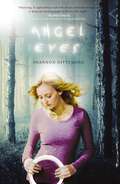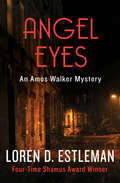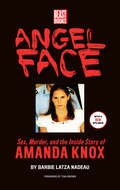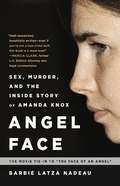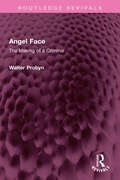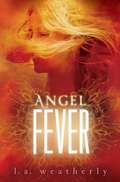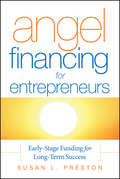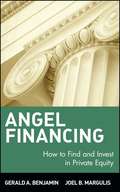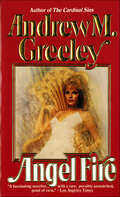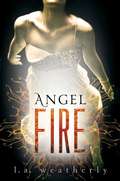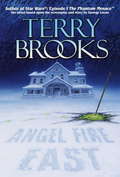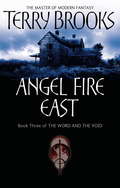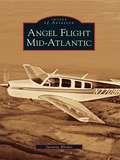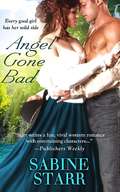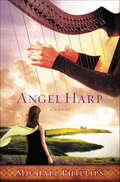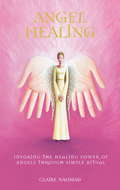- Table View
- List View
Angel Eyes (An Angel Eyes Novel #1)
by Shannon DittemoreOnce you've seen, you can't unsee.Brielle went to the city to chase her dreams and found tragedy instead. She's come home to shabby little Stratus, Oregon, to live with her grief and her guilt . . . and an incredible, numbing cold she can't seem to shake.Jake's the new guy at school. The boy next door with burning hands and an unbelievable gift that targets him for corruption.Something more than fate has brought them together. An evil bigger than both of them lurks in the shadows nearby, hiding in plain sight. Two angels stand guard, unsure what's going to happen. And a beauty brighter than either Brielle or Jake has ever seen is calling them to join the battle in a realm where all human choices begin.A realm that only angels and demons--and Brielle--can perceive.
Angel Eyes: Motor City Blue, Angel Eyes, And The Midnight Man (The Amos Walker Mysteries #2)
by Loren D. EstlemanWhen a client disappears before she can give him his assignment, Detroit PI Amos Walker must hunt down a woman he barely knows After a tour in Vietnam and several years working the streets of Detroit as a private investigator, Amos Walker has seen a lot. But he's never encountered anything quite like his newest assignment. Ann Maringer, an aging stripper hard at work at one of the city's many low-grade joints, hires him to find a missing person: herself. She expects to disappear any day now, she says, and she wants to be found. He goes to her apartment the next day, hoping for more information, but Ann was true to her word and has disappeared completely, leaving behind nothing but a carton of Bel-Airs and a dead man on the floor. Unshaken by the body or the circumstances, Walker sets out to find his client. After all, she paid in advance. This ebook features an illustrated biography of Loren D. Estleman including rare photos from the author's personal collection.
Angel Face
by Barbie Latza NadeauDespite all the airtime devoted to Amanda Knox, it's still hard to reconcile the fresh-faced honor student from Seattle with the sexually rapacious killer convicted of the November 2007 murder of her British roommate. Few Americans have heard all of the powerful evidence that convinced a jury that Knox was one of three people to sexually assault Meredith Kercher, brutalize her body, and cut her throat. In Angel Face, Rome-based Daily Beast senior writer Barbie Latza Nadeau - who cultivated personal relationships with the key figures in both the prosecution and the defense - describes how the Knox family's heavy-handed efforts to control media coverage distorted the facts, inflamed an American audience, and painted an offensive, inaccurate picture of Italy's justice system. An eye-opener for any parent considering sending a child away to study, Angel Face reveals what really went on in this incomprehensible crime.<P><P> E-book updated with a new epilogue that describes the riveting drama inside the courtroom and out, the Knox familyOCOs long crusade to free Amanda, and the reasons behind the eventual verdict of not guilty. "
Angel Face: Sex, Murder, and the Inside Story of Amanda Knox [The movie tie-in to The Face of an Angel]
by PerseusDespite all the airtime devoted to Amanda Knox, it's still hard to reconcile the fresh-faced honor student from Seattle with the sexually rapacious killer convicted of the November 2007 murder of her British roommate. Few Americans have heard all of the powerful evidence that convinced a jury that Knox was one of three people to sexually assault Meredith Kercher, brutalize her body, and cut her throat. In Angel Face, Rome-based Daily Beast senior writer Barbie Latza Nadeau - who cultivated personal relationships with the key figures in both the prosecution and the defense - describes how the Knox family's heavy-handed efforts to control media coverage distorted the facts, inflamed an American audience, and painted an offensive, inaccurate picture of Italy's justice system. An eye-opener for any parent considering sending a child away to study, Angel Face reveals what really went on in this incomprehensible crime.
Angel Face: The Making of a Criminal (Routledge Revivals)
by Walter ProbynFirst published in 1977, Angel Face documents the penal life of Walter Probyn, who spent 30 out of 44 years in prison and escaped 15 times. He describes the succession of events which began when he was a nine-year-old ‘blitz kid’ who ‘stole’ a can of peas from a bombed shop, and tells in absorbing and harrowing detail his time in prison and on the run. Important though his description and indictment of prison life and the treatment of so-called hardened offenders may be, his particular attention to carefully planned and ingenious escapes gives great insight into his fight for retaining his independence and his insatiable craving for freedom. This is not a book which glamourises crime. It does raise serious and debatable questions about the need for reform of a penal system which has failed in its objectives. These questions are discussed in an introduction and final commentary by noted criminologist, Stan Cohen, who puts Probyn’s story into a wider context. His life is a classic example of the way in which the penal system, far from curing crime, may actually encourage it, by strengthening the resolve and bitterness of those who resist being institutionalised and fitting into authority’s moulds. But is three-quarters of a lifetime a responsible price to pay? The authorities and Walter Probyn give different answers. This book will be of interest to anyone intrigued by the other side of the penal system but especially to students of law, criminology, and sociology.
Angel Falls
by Connie MannWhen her best friend is killed in an explosion, leaving Regina da Silva with her friend's young child, she doesn't realize that the child was as much a target as her friend. Brooks Anderson has been sent to find the child and bring it to the US. When circumstances bring them together in Brazil, they find themselves being pursued by a killer as they protect an orphaned babyAs the danger heightens around them, so does the attraction between Regina and Brooks, despite their differences. Regina and Brooks have both been broken by their violent pasts, but while Regina relies on her faith to deal with her past, Brooks has turned away from God. Will their pasts stop them from realizing their true feelings for each other when their pursuer strives to keep them apart forever?
Angel Falls
by Connie MannWhen her best friend is killed in an explosion, leaving Regina da Silva with her friend's young child, she doesn't realize that the child was as much a target as her friend. Brooks Anderson has been sent to find the child and bring it to the US. When circumstances bring them together in Brazil, they find themselves being pursued by a killer as they protect an orphaned baby. As the danger heightens around them, so does the attraction between Regina and Brooks, despite their differences. Regina and Brooks have both been broken by their violent pasts, but while Regina relies on her faith to deal with her past, Brooks has turned away from God. Will their pasts stop them from realizing their true feelings for each other when their pursuer strives to keep them apart forever?
Angel Falls: A Novel
by Kristin HannahFrom the #1 New York Times bestselling author of The Women comes &“a tearjerker . . . about the triumphs of family&” (Detroit Free Press).When Mikaela Campbell, beloved wife and mother, falls into a coma, it is up to her husband, Liam, to hold the family together and care for their grieving, frightened children. Doctors tell Liam not to expect a recovery, but he believes that love can accomplish what medical science cannot. Daily he sits at Mikaela&’s bedside, telling her stories of the precious life they have built together, hoping against hope that she will wake up. But then he discovers evidence of his wife&’s secret past: a first marriage to movie star Julian True.Desperate to bring Mikaela back at any cost, Liam knows that he must turn to Julian for help. But will that choice cost Liam his wife, his family, and everything he holds dear? One of Kristin Hannah&’s most moving novels, Angel Falls is a poignant and unforgettable portrait of marriage and commitment, of an ordinary man who dares to risk everything in the name of love.
Angel Fever
by L. A. WeatherlyAs half-angel Willow strives to save the world from her parasitic otherworldly kin, romance and tension heat up to a climactic finale. In the devastated remains of the world, millions of people live in "Edens" provided by the angels who have all but enslaved humanity. As the angelic stranglehold on humanity tightens, Willow and Alex are recruiting and training new Angel Killers while struggling to hold ground on the celestial battlefield. Willow continues to struggle with feelings for Seb, and her love and resolve are tested as a shattering revelation sends Alex on a separate journey. Now that the final battle versus the angels is about to begin -- and the fate of the world hangs in the balance -- each of them must face the consequences of their own choices. Will love endure? Will the human race survive?
Angel Fierce: Azura Chronicles (Azura Chronicles #2)
by Vijaya SchartzSomething’s rotten on the angel planet. When Avenging Angels turn up dead, Urielle, their Legion Commander, suspects the handsome intruder brought unspeakable evil to Azura. Maksou never met a woman he couldn’t seduce. He came to the forbidden planet to rescue his friends and get rich in the process, but the jungle crawls with lethal life forms… including a gorgeous warrior angel, who saves his life but keeps him prisoner and challenges his irresistible charm. Urielle, sworn to protect Azura at all costs, has no use for a maverick who ignores the rules and endangers the planet… no matter how attractive. Especially when the Galactic Trade Alliance (GTA) wages a secret war to get their greedy hands on the priceless crystal at Azura’s core.
Angel Financing for Entrepreneurs
by Susan L. PrestonAngel Financing for Entrepreneurs will give you the information you need to understand how angel investors think, as well as how to identify investor expectations, understand the investment analysis process, and prepare for post-investment requirements. Written by Susan Preston, an experienced angel investor, worldwide speaker and consultant on angel financing, and former Kauffman Foundation Entrepreneur-in-Residence, this hands-on resource, explains the factors that determine how private equity investors spend their money and what they expect from entrepreneurs. For example:Most venture capitalists do not invest in seed or start-up financing roundsInvestors typically require seasoned management, with successful start-up experienceInvestors are looking for entrepreneurs with passion for their ideas and the willingness to take and apply sound adviceBusiness plans must be well-written with detailed financial projections that extend 3-5 yearsInvestors are looking for a clear path to profitability in the business modelEntrepreneurs must have developed a corporate structure that is clean and uncomplicatedAnd much more
Angel Financing: How to Find and Invest in Private Equity
by Gerald A. Benjamin Joel MargulisA brief idea on how to find and invest in Private Equity and also the ways and means of diversified methods of business along with the concept of Venture capital have been illustrated in the book.
Angel Fire
by Andrew M. GreeleySomeone to watch over me? Sean Seamus Desmond, newly-announced Nobel Prize winner, relishes the unknowns of science, but a real-life mystery of love and passion. . . in the form of a beautiful woman who says she's his guardian angel? Impossible. Yet there in his New York hotel room is an enchanting creature named Gabriella Light, who inexplicably and dramatically has just saved his life.Voluptuous and exquisitely dressed, sexy Gabriella, angel or not, is determined to keep him alive as a terrifying web of intrigue closes around him. Pursued by a very real and present danger, Sean Desmond will question his own sanity and his deepest beliefs, as he experiences what cannot be rationalized away as anything other than a powerful, radiant, and transcendent love. . . one that will test him as a man too long afraid of human and divine fires within himself!A wonderful, electrifying novel, Angel Fire, will delight readers with the storytelling magic that Andrew Greeley does best. Again he has created a tale rich with suspense, breathless entertainment, compelling ideas--and fascinating charaters we love, cherish, and never forget.At the Publisher's request, this title is being sold without Digital Rights Management Software (DRM) applied.
Angel Fire
by Lisa MiscioneThe bloody murder of her mother when she was a teenager made Lydia Strong into a woman obsessed with bringing brutal killers to justice. Now thirty years old, she is a reclusive bestselling true crime writer and investigative consultant whose intuitions never lie. The latest case to capture her attention is the disappearance of three adults, each the kind of loner whose sudden absence isn't missed-they have no family, few friends. The Santa Fe Police don't see a pattern, just three people who left their empty lives behind. But when another woman turns up missing, her apartment streaked with blood, even the police have to admit that something is wrong in their usually quiet town. Lydia and P.I. Jeffrey Mark, the ex-FBI agent who solved her mother's murder, begin a relentless investigation. But it is only when the killer ups the ante and goes after Lydia herself that, just like fifteen years ago when she put the FBI on the trail of her mother's killer, the real hunt begins...
Angel Fire (Angels Trilogy #2)
by L. A. WeatherlyIn the wake of the Second Wave, the angel menace has exploded, and Alex and Willow are on the lam. Willow's prophetic dream points them to Mexico City, where they connect with a fledgling group of angel killers led by the exotically beautiful Kara, an Angel Killer from Alex's past. But the team remains suspicious of Willow, even after the more-experienced Alex takes over as leader, training them hard for a rush attack on the Seraphic Council, or "The Twelve. " This elite group of all-powerful angels is also under the scrutiny of Willow's angel-father, Raziel, who has his own sinister plan to defeat them. What Willow hasn't told Alex is that there was also a mysterious boy in her dream, one she felt overpoweringly attracted to. When brooding, gorgeous Seb shows up in the flesh, he turns out to be another - possibly the world's only other - half angel. He's been searching for Willow all his life, and when Alex enlists this rival to help keep Willow safe, he can't predict what chemistry will pass between them . . . or how far Willow might go to keep Alex safe. Will their love endure or spell doomsday for the human race?
Angel Fire East (Word and the Void #3)
by Terry BrooksAs a Knight of the Word, John Ross has struggled against the dark forces of the Void and his minions for twenty-five years. The grim future he dreams each night-- a world reduced to blood and ashes--will come true, unless he can stop them now, in the present. The birth of a gypsy morph, a rare and dangerous creature that could be an invaluable weapon in his fight against the Void, brings John Ross and Nest Freemark together again. Twice before, with the fate of the world hanging in the balance, the lives of Ross and Nest have intersected. Together, they have prevailed. But now they will face an ancient evil beyond anything they have ever encountered, a demon of ruthless intelligence and feral cunning. As a firestorm of evil erupts, threatening to consume lives and shatter dreams, they have but a single chance to solve the mystery of the Gypsy morph--and their own profound connection.
Angel Fire East: The Word and the Void Series: Book Three (Word and the Void)
by Terry Brooks***50 MILLION TERRY BROOKS COPIES SOLD AROUND THE WORLD***THE SHANNARA CHRONICLES IS NOW A MAJOR TV SERIES'Terry's place is at the head of the fantasy world' Philip PullmanAs a Knight of the Word, John Ross has struggled against the tireless dark forces of the Void for twenty-five years. Ross is driven by dreams that show the world reduced to blood and ashes by the Void and its minions. But for all his power, John Ross is only one man, while the demons he battles are legion.Then Ross learns of the birth of a rare and dangerous creature formed from the very essence of wild magics. If he can discover its secret, the creature will be an invaluable weapon against the Void. But the Void also knows its value, and will not rest until the creature has been corrupted - or destroyed. Desperate, Ross turns to Nest Freemark, a young woman with magical abilities of her own. And there they prepare to face an evil more ancient and powerful than anything they have ever encountered.Praise for Terry Brooks:'A master of the craft . . . required reading' Brent Weeks'I can't even begin to count how many of Terry Brooks's books I've read (and re-read) over the years' Patrick Rothfuss, author of The Name of the Wind'I would not be writing epic fantasy today if not for Shannara' Peter V. Brett, author of The Painted Man'If you haven't read Terry Brooks, you haven't read fantasy' Christopher Paolini, author of EragonThe Word and the Void:RUNNING WITH THE DEMONA KNIGHT OF THE WORDANGEL FIRE EAST
Angel Flight Mid-Atlantic (Images of Aviation)
by Suzanne RhodesIn 1972, two pilots--one a federal career engineer, the other the pastor of a prominent church in Washington, D.C.--discovered a common passion for flying airplanes and serving people. One day over lunch, the men conceived a flight plan, one that would undergo many changes before becoming Angel Flight Mid-Atlantic, as it is known today. Ed Boyer of the U.S. Department of Health and Human Services and Dr. Louis Evans, pastor of the National Presbyterian Church, discussed how to pool their interests and qualifications. From its beginnings as a charitable shuttle service for religious leaders and dignitaries, to full-scale charitable air ambulance operations, to Angel Flights for ambulatory patients, the initial vision has grown into a network of over 1,500 volunteer pilots in the Mid-Atlantic region who use their private planes to fly people in need to specialized treatment. Angel Flight coordinates missions of mercy from its offices in Virginia Beach, helping patients to find "the shortest distance between home and hope."
Angel Gone Bad (Gone Bad #2)
by Sabine StarrA Good Plot. By day Angel Morgan reads her thrilling dime novels about the Wild West to the corseted members of the Red River Book club. But when the sun sets on the Texas border her own life proves to be stranger than fiction, especially when a friend's life depends on her utilizing her many secret talents. . .A Surprise Ending. Rune Wulfsson is no stranger to Angel Morgan's talents--the ones that left him burning for more and the ones that left him wrongfully locked up in jail. Now that he's no longer behind bars, he's riding hard for some good old fashioned revenge. But first he needs Angel's help in hunting down some horse thieves, kidnappers and killers. Tough enough without Angel and Rune's hands all over each other. It gets worse. But sometimes, bad is good. . .
Angel Harp: A Novel
by Michael PhillipsWidowed at 34, amateur harpist Marie "Angel" Buchan realizes at 40 that her life and dreams are slowly slipping away. A summer in Scotland turns out to offer far more than she ever imagined! Not only does the music of her harp capture the fancy of the small coastal village she visits, she is unexpectedly drawn into a love triangle involving the local curate and the local duke.The boyhood friends have been estranged as adults because of their mutual love of another woman (now dead) some years before. History seems destined to repeat itself, with Marie in the thick of it. Her involvement in the lives of the two men, as well as in the community, leads to a range of exciting relationships and lands Marie in the center of the mystery of a long-unsolved local murder. Eventually she must make her decision: with whom will she cast the lot of her future?
Angel Healing
by Claire NahmadClaire Nahmad reveals how to attune to the healing angels through simple ceremony and ritual, on a well-defined and practical basis. Anyone can put these simple healing practices into force-for the benefit of both themselves and others. This inspiring book explains: how to work with the chakras and how they are linked with the stars and angel hierarchy, the various subtle angelic color rays-and how to direct these rays through your hands and thought to transmit their healing energy, how to lay out a Crystal Healing Web around a patient to revive and heal, how to create an angel altar-a powerful magnetized center, how to summon the specific angel you need, such as the Angel of Faith, the Angel of Courage and the Angel of Joy at times of worry, fear, and hopelessness, how to absorb the energy or light-ray of an angel and how angels can help rid the body of negative energy patterns associated with disease and pain.
Angel Heart
by Marie LavalDevonshire, January 1815. Marie-Ange, the young widow of an English officer, accepts an inheritance in France only to find that everything in Beauregard is not as it seems. Why is the sinister Malleval so obsessed with her family? And could her darling Christopher still be alive? Marie-Ange finds herself trapped in a dangerous web of lies, intrigue, and mystical possession, and the only person to whom she can turn for help is Capitaine Hugo Saintclair. Yet the enigmatic Hugo represents a danger of a different kind ... Angel Heart is a lavish mix of romance, adventure, and a hint of the supernatural, largely set in France against the turbulent background of Napoleon's return from Elba.
Angel Heart
by Marie LavalDevonshire, January 1815.Marie-Ange, the young widow of an English officer, accepts an inheritance in France only to find that everything in Beauregard is not as it seems. Why is the sinister Malleval so obsessed with her family? And could her darling Christopher still be alive? Marie-Ange finds herself trapped in a dangerous web of lies, intrigue, and mystical possession, and the only person to whom she can turn for help is Capitaine Hugo Saintclair. Yet the enigmatic Hugo represents a danger of a different kind ?Angel Heart is a lavish mix of romance, adventure, and a hint of the supernatural, largely set in France against the turbulent background of Napoleon?s return from Elba.
Angel Heart
by Sharon Maria BidwellSequel to Snow AngelLast year, Dean Chapman fell in love ... with another man. He’s fallen for childhood friend Jay Reid, and as Jay is a kind, loving soul, Dean knows he holds an angel’s heart in the palm of his hand.Since they’ve moved in together, most of their friends and family have been supportive. But the one person who knows just how to wind him up, drop him down, and step all over him is the one woman who should be on their side -- Jay’s sister, April. Instead, she’s waiting for Dean to fail big time. He’s determined to prove her wrong, but only time can do that, and he isn’t the most patient of men.Worse, sometimes Dean fears that, despite his resolve, he’ll lose the only person who has ever made his heart race. Jay should have someone who can love him completely, and give him everything he needs both emotionally and physically. If Dean wants to keep Jay, he has to give himself up to a gay relationship completely, which includes his heart and some rather intimate parts of his body.Jay has total faith in his lover and patience ... plenty of patience. Dean needs time and Jay knows April isn’t helping, and she’s about to piss him off one last time. It’s their parents’ ruby wedding anniversary and they’re about to spend the night in a lovely country hotel. Both men are in for a few surprises, not least of which is the four-poster bed Jay’s parents have arranged for them. First there’s the church blessing to get through, people to meet, the peace to keep, dinner to eat, and an unexpected declaration of love, and that’s without throwing the strawberry lube Jay adores into the mix.There’s a reason Dean calls his lover Angel, but Jay’s thoughts are far from angelic. Can he stop his sister from interfering with his love life? And remember to ask if Dean packed the strawberry lube for the weekend?
